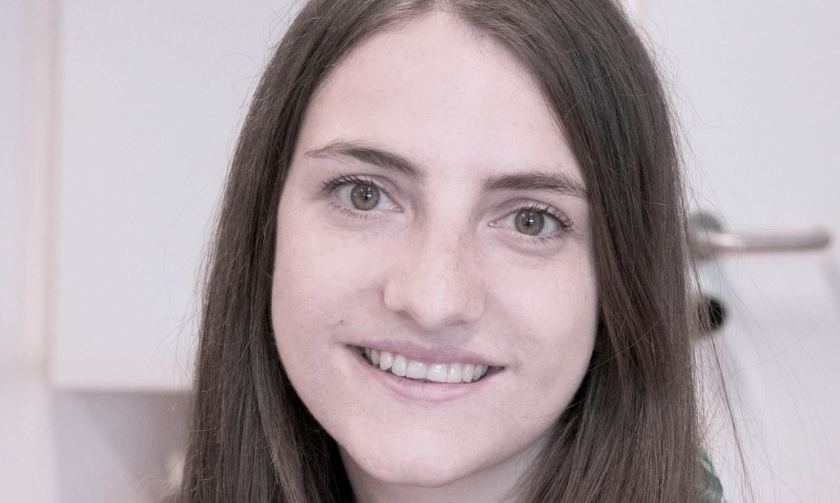Outstanding master thesis on the structure and function of a bacterial enzyme honoured

Lena Graß has received an award by GBM for her master thesis. © FU Berlin
On December 17, 2018, Lena Graß, a PhD student from the Structural Biochemistry Group at Freie Universität Berlin, was awarded the Master Prize of the Gesellschaft für Biochemie und Molekularbiologie e.V. (Society for Biochemistry and Molecular Biology) (GBM). For her master thesis at Freie Universität Berlin and the MX beamlines of BESSY II, she deciphered the structure and function of a so-called RNA helicase.
These bacterial enzymes can alter the activities of RNA molecules and influence the life cycle of bacteria. As part of her master's thesis, Lena Graß investigated a RNA helicase from the intestinal bacterium Escherichia coli. A closely related enzyme from the bacterium Borrelia burgdorferi, the causative agent of borreliosis, is essential for the infectivity of these bacteria. A better understanding of this enzyme could help to develop new drugs to block the enzyme.
Graß produced the enzyme using genetic engineering methods. Using macromolecular X-ray crystallography on the MX beam tubes of the Joint Berlin MX Laboratory at BESSY II, Graß was able to elucidate how the enzyme is constructed and folded in detail.
Graß began her master's degree in biochemistry at the Eberhard Karls University of Tübingen in 2015 and completed her master's thesis in the structural biochemistry group of the Freie Universität Berlin in cooperation with the macromolecular crystallography group at the Helmholtz-Zentrum Berlin. At the beginning of 2018, she completed her master's degree with the highest grade. She is currently doing her doctorate in the structural biochemistry group at Freie Universität.
red.
https://www.helmholtz-berlin.de/pubbin/news_seite?nid=20262;sprache=en
- Copy link
-
MXene for energy storage: More versatile than expected
MXene materials are promising candidates for a new energy storage technology. However, the processes by which the charge storage takes place were not yet fully understood. A team at HZB has examined, for the first time, individual MXene flakes to explore these processes in detail. Using the in situ Scanning transmission X-ray microscope 'MYSTIIC' at BESSY II, the scientists mapped the chemical states of Titanium atoms on the MXene flake surfaces. The results revealed two distinct redox reactions, depending on the electrolyte. This lays the groundwork for understanding charge transfer processes at the nanoscale and provides a basis for future research aimed at optimising pseudocapacitive energy storage devices.
-
Bernd Rech elected to the BR50 Board of Directors
The Scientific Director at Helmholt-Zentrum Berlin is the new face behind the "Natural Sciences" unit at Berlin Research 50 (BR50). Following the election in December 2025, the constituent meeting of the new BR50 Board of Directors took place on 22 January 2026.
Its members are Michael Hintermüller (Weierstrass Institute, WIAS), Noa K. Ha (German Centre for Integration and Migration Research, DeZIM), Volker Haucke (Leibniz Research Institute for Molecular Pharmacology, FMP), Uta Bielfeldt (German Rheumatism Research Centre Berlin, DRFZ) and Bernd Rech (HZB).
-
AI re-examines dinosaur footprints
For decades, paleontologists have pondered over mysterious three-toed dinosaur footprints. Were they left by fierce carnivores, gentle plant-eaters, or even early birds? Now, an international team has used artificial intelligence to tackle the problem—creating a free app that readily lets anyone decipher the past.
